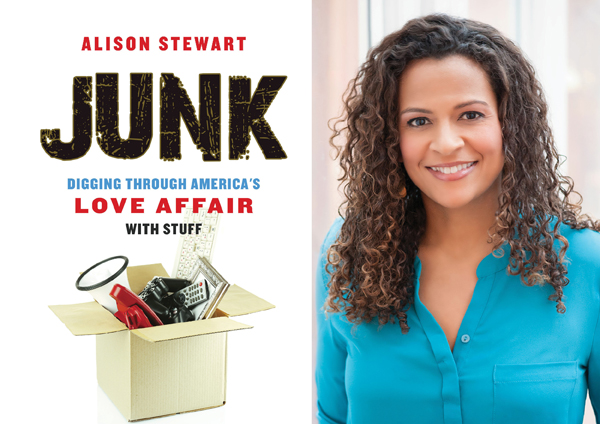
Book by Alison Stewart, Review by Terri Schlichenmeyer
You know exactly where you put your glasses. Well, kind of. You remember that you put them down in the kitchen, but then you piled mail, a plastic fork, a magazine, and a pair of gloves on them. Your glasses are right where you left them: under other things. And once you read “Junk” by Alison Stewart, you’ll see those things differently.
Five decades of stuff.
That’s what Alison Stewart and her sister faced when it came time to clear their parents’ home – a mess, the result of “50 years of life” that filled the entire basement, packed to the ceiling.
Why, she wondered, do we hang on to the things we keep? How come we collect some items and toss away others? Why do folks often happily accept other people’s cast-offs? Stewart decided to find out.
To begin, she defines junk as “worthlessness.” Stuff is something you don’t want anymore but that someone else might find useful, and treasures “are any stuff or junk that appeals to you.” A third of us collect something, Stewart says, though professionals “make a distinction between collectors and clutterers.” Then there are packrats, while hoarders fall under a newly-created psychiatric category all their own.
At “a giant 250-mile-long junk-a-palooza” rummage sale in the South, Stewart promised herself that she wasn’t going to buy anything but, of course, she couldn’t resist. In Austin, Texas, she visited The Cathedral of Junk and spoke with the man who created the “creative, chaotic colossus.”
She learned that humans weren’t the only creatures to be inveterate collectors.
In several different cities, Stewart rode shotgun with junk collectors, clean-up crews, and haulers, to get a feel for the kind of things people throw out and what’s done with it. She met the World’s First Official Spammer, she learned why we get so much “junk mail,” she asked about space junk, spoke with professional clutter-fighters and “freecyclers,” talked with TV producers about pawn stores and picking, and she learned some good news: if you have just too much stuff, there’s plenty of help available.
When it comes to possessions, are you downsizing…or oversized? Whichever direction you’re heading, “Junk” can help you spot the bigger picture.
It’s hard not to look around with a critical eye when you see what author Alison Stewart discovered; why you’ve saved trinkets from high school, broken tools, plastic silverware, and unfinished projects will never seem so puzzling. And then, turning things around, we get a serious (yet light-hearted) look at other people’s junk, how it’s tossed, and where it goes once it’s gone.
In that, Stewart is respectful and doesn’t pick on anyone, but who can resist peeking? Who doesn’t want to see a happy ending to still-useful things?
Yes, this is interesting…um, stuff.
This is not a self-help book. It won’t tell you how to empty your crammed closets, busting basements, glutted garages, or stuffed sheds, but it’s engaging and plenty fun to read – which makes “Junk” a great book to put in your hands.
Terri Schlichenmeyer, also known as “The Bookworm,” is a professional book reviewer. Terri has been reading since she was three years old, and she never goes anywhere without a book. She lives in Wisconsin with her two dogs and 14,000 books.
For more book reviews visit greenlivingaz.com/bookreviews





